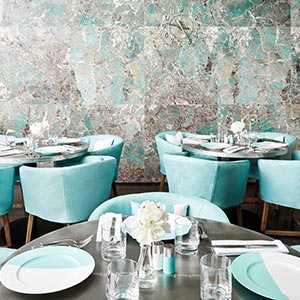
Breakfast at Tiffany’s will soon be offered not only to would-be Holly Golightlys in New York City, but also to their counterparts in Asia.
Tiffany & Co. plans to open two more Blue Box Cafés, at its Shanghai flagship and at a store in Hong Kong, chief executive officer Alessandro Bogliolo announced during a conference call following its second quarter financial results, as transcribed by SeekingAlpha.
Those are the first permanent cafés it has opened since it debuted its first-ever restaurant (pictured) at its New York City flagship in 2017.
Bogliolo said the company also wants to beef up its network of duty-free airport stores and is debuting a new store at the Beijing airport.
The retailer also plans to keep up its focus on offering new lines and products. In the last year it’s launched Paper Flowers, Tiffany True, and the Return to Tiffany Love Bugs.
Tiffany has “accelerated the pace of product design and development,” Bogliolo said, adding that to “revamp a product assortment on a brand like Tiffany, it’s a multiyear process.”
Still, the brand doesn’t want to overload the consumer.
“In the past few years, our number of introductions of distinctive new products was below industry standard,” Bogliolo said. “We decided one and a half years ago to increase that level to industry standard, that is, roughly speaking around the 15% of sales coming from newness.
“More than that would be too much,” he continued. “There is only a number of new products that customers can absorb. Jewelry is different from fashion, [where] every season, everything changes.”
Bogliolo said that the company’s recent redesign of its website has been “disruptive,” causing online sales to trend downward.
“When you change completely your platform, especially the wording, it has an impact on the search engine optimization,” he said. “It can take a few months in order to come back to the normal efficiency. But we were expecting that, and we are seeing an improvement.”
Executive vice president and chief financial officer Mark Erceg said that the company was worried about the current trade war, especially since Tiffany manufactures product in the United States that may be tariffed when it is imported into China and possibly elsewhere.
“The biggest concern that we have, frankly, on a longer-term basis is the tariff differential between a company such as ourselves, who manufactures most things in the U.S., versus some of the European competitors,” he said. “[Last quarter,] we didn’t feel it would be appropriate to take pricing actions and maybe do that unilaterally and get ourselves into an uncompetitive price situation. So we did have to eat that last round of tariffs. Whether or not we have to do something like that again, we have to make that determination.”
The announcements came as the company released mixed financial results, with global sales dropping 3% to $1 billion for the second quarter of fiscal 2019 (ended July 31). Overall comps dropped 4%.
Bogliolo blamed the drop, in part, on political turmoil in Hong Kong, its fourth largest market, which caused its stores to lose six selling days.
While net earnings for the quarter declined 6% to $136 million, that number was better than expectations, Bogliolo said.
Jewelry collection sales were flat in the quarter, while engagement jewelry sales declined 3% and designer jewelry sales fell 10%.
(Image courtesy of Tiffany & Co.)
- Subscribe to the JCK News Daily
- Subscribe to the JCK Special Report
- Follow JCK on Instagram: @jckmagazine
- Follow JCK on X: @jckmagazine
- Follow JCK on Facebook: @jckmagazine